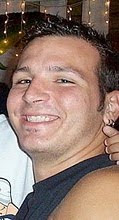Many people arrange the dice to a particular set, and then shake them in their hands before chucking them haphazardly down the table. That's not a Precision Shooter. Some people will carefully set the dice, and then let go with a Nolan Ryan-type fastball pitch that could easily reach the back wall of the casino let alone the back wall of the dice table. That's not a Precision Shooter. Still other people will set the dice, and then loft them. After making quite a few rolls and hitting several numbers, they will shoot at an entirely new spot on the table because although they've rolled eight or ten times and hit Place numbers most of those times, their Point number has yet to appear. Feeling impatient with their efforts, they feel the need to "get on with it." They surely do get on with it since the dice are invariably moved on to the next shooter because of the 7-out that they just rolled. That is not a Precision Shooter.
The Precision Shooter arranges the dice to various "sets" or dice-face combinations. These sets are dependent upon a number of variables such as his shooting style or more importantly whether it is the come-out roll or the Point has already been established. He knows that a particular set will give him a higher occurrence of some numbers over others that would normally appear out of the thirty-six possible dice combinations.
The Precision Shooter grips the dice in such a way that he will have full control of the dice through the entire motion of his arm and wrist movement up until the point when he releases the dice. There are several different grips such as the often used "three-fingers on the front and thumb on the back,"(which is what I use) or the "stacked dice squeeze," or even the "thumb and fourth finger axis-pincer" grip. The use of different grips in craps is exactly the same as grip variations in baseball such as the fast-ball, sinking-ball, slider, etc. all demanding different grips on different parts of the baseball. Professional baseball pitchers don't just randomly throw the ball forward like it's a shot-put or bird seed in the unlikely hope that the umpire calls it a strike.
The Precision Shooter aims the dice to a specific spot on the table. Without getting into a long dissertation about where to throw the dice, suffice it to say that several spots work well. The dice table is the batter's box, and the strike zone can often vary from table to table. In fact, new dice at the beginning of a shift will react totally differently than heavily-used eight-hour-old worn dice. The same holds true for worn out felt layouts versus new ones, or tables where a spongy underlay has been installed under the felt. Each situation has to be looked at and evaluated. Too much work? For 99% of craps players the answer to that would be "hell yeah." However, for the 500 or so people who make a fine living playing craps, I would humbly suggest that their answer would be quite different.
The Precision Shooter lofts the dice without too much force or in-air spin. What spin you do see is on the forward axis only. When the dice land you will see a little bit of forward tumbling, but the dice stay on the same axis. They may hit the base of the pyramid-shaped "egg-crate" wall, and gently roll back a turn or two, or just stop dead at the base of the wall. The important observation is that the Precision-Shooter does it consistently. A consistent throw, whether in baseball, bowling, football or craps, is the path to profit.
The Precision Shooter carefully observes the outcome of the roll. He knows from his previous experience that he will throw a heavier proportion of some numbers compared to others. He will set his betting pattern to take maximum advantage of those numbers as they are rolled. If particular numbers are showing up frequently on his current roll, he may even adjust his betting to account for these short-term opportunities.
The Precision Shooter understands the dice and what they are doing, their randomness, and the effect he can have on de-randomizing the outcomes of his rolls. He understands that if his shooting produces a lot of 3's, his betting will reflect that knowledge even after the come-out roll, and even though the house edge appears to be very high. That bet may be his consistent money-maker. Another Precision Shooter may recognize that he throws a lot of outside Place numbers and bets accordingly. Yet another Precision Shooter doesn't have any idea what he'll be throwing, but he does know that his average throws before the 7 shows is currently 18 rolls and climbing. While this player's betting pattern may be more difficult, his opportunity is higher because the longer he holds the dice, every roll becomes a potential windfall of profit.
So if you are standing at the craps table, observe each shooter. Are they setting the dice, and using a particular grip? Do they seem to be taking aim at an invisible target area on the table, and gently lofting the dice without causing too much spin? Are some numbers appearing in disproportionate frequency than others? If he's thrown nine 4's and six 10's, but neither the 6 or 8 have appeared, that would probably be a sign to even a vision-impaired person that an opportunity to make money was clearly at hand. If he is always throwing more than eight times before a "7-out," and his roll-count is consistently over twelve, then you don't need to call Jo-Jo from the Psychic Friends Network; you need to be betting on this guy's roll because you have found yourself a bona-fide Precision Shooter.
Good Luck and Good Skill at the tables!
Out…Cundiff







No comments:
Post a Comment